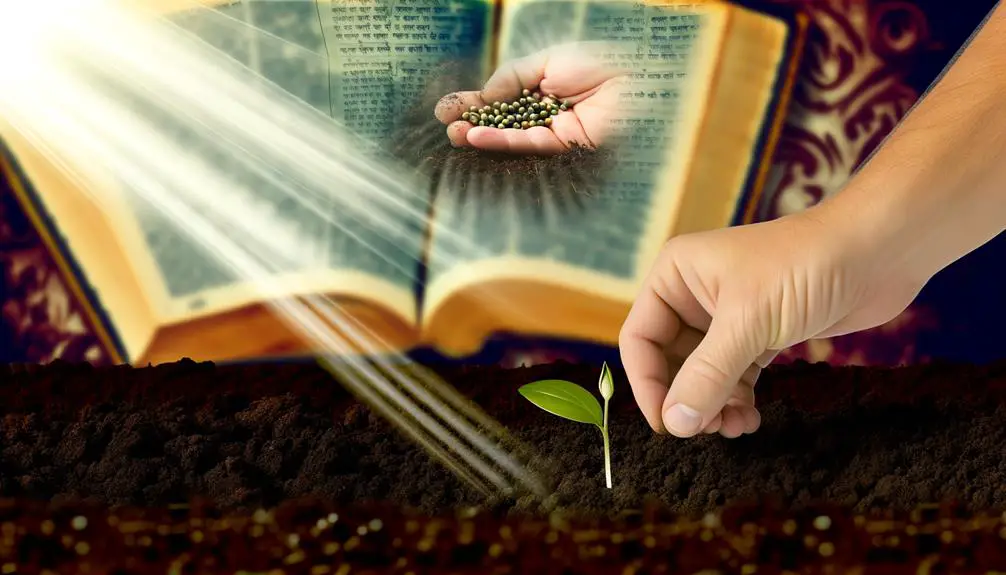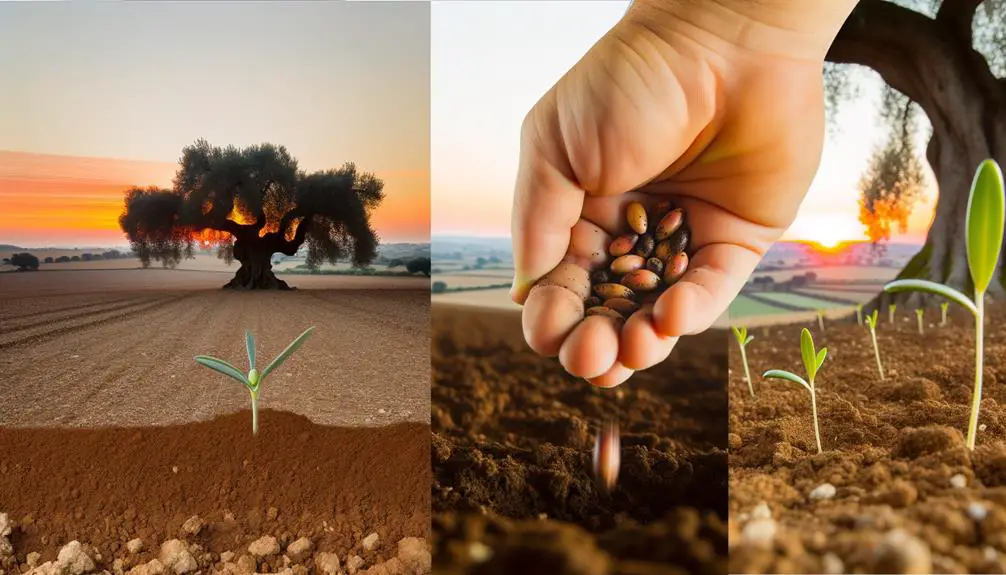Cultivating seeds of faith in life's garden, the Bible's parables reveal profound truths about growth and resilience; discover what it means to truly sow.

Sowing Seeds Meaning in the Bible
When a farmer scatters seeds across his field, he's laying the foundation for future growth, much like the biblical parables teach you about the spiritual sowing and reaping in life. In these narratives, you'll discover how seeds of faith, once planted in fertile soil, can flourish into a harvest of righteousness.
But what does it truly mean to sow these seeds in the context of your own life? As you consider the principles of spiritual growth and the mustard seed faith, remember that the journey from sowing to reaping is fraught with challenges and lessons.
Let's explore how cultivating patience and perseverance today can lead to an abundant harvest tomorrow.
Key Takeaways
- The parable of sowing seeds illustrates the varied responses to God's Word based on the condition of one's heart.
- Cultivating faith is likened to gardening, requiring removal of obstacles and nurturing with positive influences for growth.
- The concept of reaping what you sow underscores moral accountability and the consequences of one's actions in life.
- Mustard seed faith highlights the immense potential of even the smallest faith to grow and effect spiritual transformation.
The Parable of the Sower

In the Parable of the Sower, Jesus employs a vivid agricultural metaphor to illustrate the varied responses of individuals to the Word of God. This parable, rich in symbolism, likens the hearts of listeners to four types of soil, each representing a distinct listener's response to spiritual teachings.
The first type of soil, the path, signifies individuals whose hearts are hardened. Messages of faith don't penetrate these hearts, much like seeds can't germinate on a trodden path. Here, the listener's response is one of indifference or outright rejection, often leaving no room for spiritual growth.
Contrastingly, the rocky soil illustrates those who receive the Word with initial enthusiasm but lack depth. Their faith, much like roots in shallow soil, withers under adversity. This tells you that a superficial acceptance without firm foundation leads to a faltering faith.
Thorny soil represents lives overwhelmed by worldly worries and materialism, choking spiritual growth. This listener's response is akin to seeds struggling to thrive among thorns, symbolizing the distraction and ultimate barrenness brought on by misplaced priorities.
Finally, the good soil epitomizes the ideal response: openness and understanding. Here, seeds of faith not only germinate but flourish, producing an abundant yield. This soil type encourages you to reflect on your own receptivity, urging a cultivation of heart that fosters deep, enduring faith.
Analyzing these soil types within the context of the Parable of the Sower, you're equipped to assess your own spiritual receptivity, understanding the pivotal role of the listener's response in the journey of faith.
Seeds of Faith

As you explore the concept of 'Seeds of Faith' within biblical texts, consider how the metaphor of sowing seeds illuminates the processes of cultivating faith's ground, harvesting spiritual growth, and nurturing belief's garden. These points underscore the dynamic relationship between human agency and divine grace in the development of faith.
They invite a deeper understanding of how believers actively participate in their spiritual maturation, guided by scriptural teachings.
Cultivating Faith's Ground
Cultivating the ground for seeds of faith requires a deliberate and thoughtful approach, embedding principles that foster spiritual growth and resilience. This process, akin to faithful stewardship, demands an active engagement with one's beliefs and values, ensuring that the environment is conducive to nurturing these nascent seeds.
Through spiritual cultivation, you're not merely attending to the immediate needs of your faith but preparing the soil for sustained growth. It involves removing obstacles that hinder spiritual development, such as doubt and negativity, and enriching the ground with positive influences and practices.
Just as a gardener amends the soil with nutrients, you must infuse your life with actions and thoughts that promote a robust faith, paving the way for a deeper, more meaningful spiritual journey.
Harvesting Spiritual Growth
Harvesting spiritual growth from the seeds of faith you've diligently sown demands recognizing the fruits of your spiritual labor. This process isn't merely about external manifestations but, more importantly, about inner transformation and the critical role of spiritual pruning in facilitating growth. The journey of faith is marked by:
- Acknowledgment of Change: Recognizing the signs of inner transformation as evidence of spiritual progress.
- Embracing Spiritual Pruning: Understanding that removal of certain habits or beliefs fosters healthier spiritual growth.
- Patience in Growth: Accepting that spiritual maturity develops over time, not overnight.
- Continuous Nurturing: Committing to ongoing personal and spiritual development to sustain growth.
Analyzing these elements provides a comprehensive view of how seeds of faith evolve into mature, fruitful expressions of spiritual life.
Nurturing Belief's Garden
Having explored the critical facets of harvesting spiritual growth, it's essential to examine how nurturing the garden of belief forms the bedrock of a flourishing faith.
As you navigate through life, growth challenges inevitably arise, testing the resilience of your belief. These trials are akin to natural elements that threaten a garden's vitality. Yet, just as a gardener adapts, learning to shield and nurture their plants, you too must cultivate belief resilience.
Harvest of Righteousness

In biblical discourse, the concept of a 'Harvest of Righteousness' symbolizes the divine reward for those who live by God's principles, emphasizing the moral and spiritual recompense for adhering to a virtuous path. This concept is deeply intertwined with righteous actions and ethical living, serving as the foundation upon which the idea of a spiritual harvest is built.
When you engage in righteous actions, you're essentially planting seeds in the spiritual realm. These seeds, nurtured by ethical living, grow into a harvest that embodies the very essence of divine justice and moral integrity. The pathway to achieving a Harvest of Righteousness can be illuminated through the following elements:
- Righteous Actions: Actions that align with divine principles set the stage for a bountiful harvest. These are deeds done not just in compliance with moral codes, but with a heart and spirit attuned to God's will.
- Ethical Living: Ethical living acts as the soil that nourishes the seeds of righteousness. It's a lifestyle choice that prioritizes integrity, honesty, and compassion in daily interactions.
- Patience in Growth: Just as a physical harvest requires time to grow, the Harvest of Righteousness unfolds in God's timing, demanding patience and steadfast faith from you.
- Reaping with Joy: The culmination of righteous living is a joyous reaping, where you experience the profound peace and spiritual fulfillment that come from a life well-lived in alignment with God's desires.
Understanding and embodying these principles ensures that your life's journey is marked by a profound and rewarding Harvest of Righteousness, reflecting the ultimate fulfillment of living in harmony with divine will.
Principles of Spiritual Growth

In exploring the tenets of spiritual growth within biblical contexts, you must consider the intrinsic link between cultivating faithful hearts and harvesting spiritual wisdom.
This process is reflective of a journey that intertwines personal development with divine understanding, as depicted in scriptural narratives.
Analyzing these principles offers insights into how spiritual maturity is achieved through intentional actions and reflective contemplation.
Cultivating Faithful Hearts
Cultivating faithful hearts requires a deliberate effort to nurture spiritual growth through consistent practice and reflection. This process, akin to heavenly cultivation or divine gardening, involves several key practices:
- Daily Devotionals: Dedicate time each day to study scripture and pray, laying a foundation for spiritual insight and connection.
- Community Engagement: Participate in faith communities where you can share experiences, learn from others, and grow together.
- Service and Acts of Kindness: Embody the teachings of scripture through service to others, fostering a deep sense of empathy and love.
- Meditation and Contemplation: Reflect on your spiritual journey and the teachings of scripture, allowing for a deeper understanding and relationship with the divine.
These practices, rooted in biblical principles, guide you toward a more profound, faithful heart.
Harvesting Spiritual Wisdom
Harvesting spiritual wisdom demands that you engage deeply with principles of spiritual growth, fostering an environment where knowledge and understanding can flourish.
Wisdom cultivation isn't a passive endeavor; it's an active process akin to insightful planting. You must deliberately sow seeds of wisdom in the fertile soil of your heart, ensuring each thought and action contributes to your spiritual development.
This process involves discerning reflection, steadfast prayer, and the application of scriptural truths to daily life. Just as a farmer tends to their crops with care, you're called to nurture your spiritual growth with diligence.
Through this meticulous cultivation, you'll reap a harvest of profound understanding and enlightenment, embodying the essence of spiritual maturity and insight.
The Mustard Seed Faith

Drawing from biblical narratives, the concept of mustard seed faith illustrates the profound impact of even the smallest measure of belief in God's kingdom. This metaphor not only encourages believers but also offers a nuanced understanding of faith dynamics. It's pivotal to recognize how this small seed mirrors profound spiritual truths.
- Mountain Metaphor: Jesus uses the mustard seed to explain that faith, no matter how minuscule, can move mountains. This isn't just poetry but a radical assertion about the power of faith in the believer's life. It suggests that faith's potency isn't in its size but in its presence.
- Faith Dynamics: The mustard seed analogy underscores a dynamic, growing aspect of faith. It starts small but has the potential to expand beyond initial expectations, symbolizing spiritual growth and the expansive nature of God's kingdom.
- Spiritual Potential: The mustard seed represents the inherent potential within faith. Like the seed that grows into a tree, the smallest faith can lead to significant spiritual transformations, emphasizing that it's not the quantity of faith but its quality and sincerity that matters.
- Kingdom of God: The growth of the mustard seed into a large tree symbolizes the expansive and inclusive nature of God's kingdom. It suggests that God's kingdom starts small within the hearts of believers and expands outward, encompassing all who come into contact with it.
Reaping What You Sow

CURRENT SUBTOPIC: 'Reaping What You Sow'
Delving into the biblical principle of 'reaping what you sow,' it's imperative to understand that actions and decisions inevitably shape one's spiritual journey and outcomes. This concept isn't merely about punishment or reward; it's a profound reflection on moral accountability and the inevitability of karmic consequences. The Bible intricately links the acts of sowing with the certainty of reaping, underscoring a divine order that governs moral conduct and its repercussions.
Aspect |
Biblical Perspective |
Implication |
|---|---|---|
Actions |
Galatians 6:7 |
"Do not be deceived: God cannot be mocked. A man reaps what he sows." This verse encapsulates the undeniable truth that one's actions directly influence their fate, emphasizing moral accountability. |
Intentions |
2 Corinthians 9:6 |
"Whoever sows sparingly will also reap sparingly, and whoever sows generously will also reap generously." It suggests that the quality and intention behind actions are just as critical, with generosity leading to abundant karmic returns. |
Consequences |
Job 4:8 |
"As I have observed, those who plow evil and those who sow trouble reap it." This highlights the principle of karmic consequences, where engaging in morally reprehensible activities invariably leads to suffering. |
Analyzing these perspectives, it's clear that the Bible advocates for a conscientious approach to life, where every action, intention, and its ensuing consequence are intricately connected. Understanding this principle encourages a life led by positive actions and moral integrity, reinforcing the importance of being mindful of the seeds one sows in their spiritual and moral journey.
Cultivating Patience and Perseverance

Building on the understanding that our actions and their consequences are deeply intertwined, it's equally important to consider how cultivating patience and perseverance plays a crucial role in navigating the spiritual journey. The biblical narrative is replete with instances underscoring the necessity of developing these virtues, especially during waiting seasons and enduring trials. This process isn't merely about passive waiting but involves an active engagement with faith, hope, and love.
- Enduring Trials: The Bible frequently likens the believer's journey to that of a farmer who sows seeds and waits for the harvest. This metaphor extends to enduring trials, where you're encouraged to see challenges not as obstacles but as opportunities for growth. James 1:3-4 reminds you that the testing of your faith produces perseverance, shaping character and leading to spiritual maturity.
- Waiting Seasons: Scripture is clear that there are seasons for everything, including waiting. These periods aren't voids but fertile ground for spiritual deepening. Isaiah 40:31 promises strength to those who wait on the Lord, illustrating how patience can renew and empower you.
- Active Engagement: Cultivating patience and perseverance isn't a passive endeavor. It involves active trust in God's timing and promises, daily prayer, meditation on Scripture, and maintaining fellowship with other believers. This engagement enriches your faith, making the waiting and enduring more bearable and purposeful.
- Harvest of Righteousness: Ultimately, Hebrews 12:11 assures that discipline, though painful, yields a peaceful fruit of righteousness to those trained by it. Your perseverance and patience, cultivated through trials and waiting, lead to spiritual harvests that far outweigh the temporary discomforts.
In essence, the biblical perspective on cultivating patience and perseverance is rooted in an active, hopeful waiting and enduring that shapes you into a more resilient and faithful believer.
Frequently Asked Questions
How Do Biblical Teachings on Sowing Seeds Relate to Modern Environmental Stewardship and Conservation Efforts?
You're exploring how ancient wisdom intersects with today's battle against climate change. Biblical teachings on sowing seeds, although not directly mentioning modern issues, can inspire a respect for the land that aligns with current environmental stewardship and conservation efforts.
The concept encourages you to adopt sustainable practices and innovative seed technology, ensuring a healthier planet. This approach not only respects biblical principles but also addresses urgent environmental challenges.
In What Ways Do Non-Christian Cultures and Religions Share Similar Concepts or Stories to the Sowing Seeds Parables Found in the Bible?
Across various cultures and religions, you'll find cultural parallels and mythological similarities to the concept of sowing seeds. These narratives often embody themes of renewal, growth, and the cyclical nature of life.
They reflect a universal understanding of the importance of planting for future generations. By examining these stories, you're diving into a rich tapestry of beliefs that, despite differing in details, share a core emphasis on nurturing and stewardship.
Can the Concept of Sowing Seeds in the Bible Offer Insights Into Modern-Day Business Ethics and Practices?
Absolutely, delving into the essence of sowing seeds can illuminate modern-day business ethics and practices. Like seeds planted with care, investment strategies must be nurtured with patience and foresight.
Similarly, leadership models can draw inspiration from the meticulous and deliberate cultivation of these seeds, promoting growth and sustainability. Analyzing this concept through a scholarly lens offers profound insights into fostering ethical environments and innovative practices in today's rapidly evolving business landscape.
How Has the Interpretation of Sowing Seeds Parables Changed With New Archaeological Discoveries and Historical Research?
As new archaeological discoveries and historical research emerge, your understanding of ancient farming practices deepens, influencing the textual analysis of parables.
These insights shift interpretations, shedding light on the nuanced ways seeds were sown and managed in ancient times.
This evolving context enriches the analysis, offering a more layered understanding of the narratives and their implications.
It's a scholarly journey that continuously reshapes your grasp of these ancient texts.
What Role Do Sowing and Harvesting Metaphors Play in the Bible's Teachings on Community Building and Social Justice?
You're reaping what you sow when exploring how sowing and harvesting metaphors influence the Bible's teachings on community building and social justice.
These agricultural practices aren't just about crops; they're a blueprint for fostering unity and equity.
Conclusion
In conclusion, the biblical metaphor of sowing seeds intricately weaves a narrative that underscores the quintessence of faith, growth, and moral rectitude.
You're invited to delve into the profound layers of meaning, recognizing that each seed of faith planted, nurtured with patience and perseverance, promises a harvest of righteousness.
Analyzing these parables reveals a universal truth about the principles of spiritual growth and the inevitable consequence of our actions, urging a reflective cultivation of one's inner spiritual landscape.



Sign up